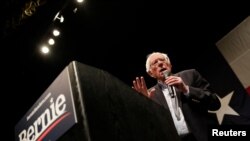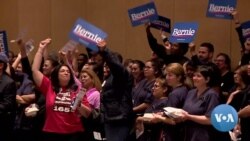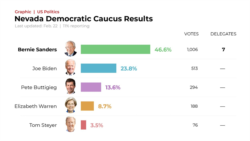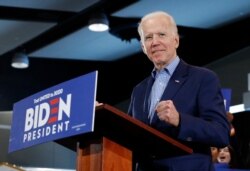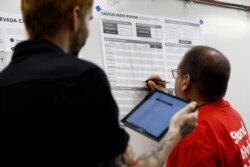Democratic presidential candidate Bernie Sanders won Saturday in Nevada's presidential caucuses, taking the overall lead in delegates and cementing his front-runner status.
The Nevada caucuses were the third contest for the Democratic presidential hopefuls pursuing their party’s nomination to take on incumbent Republican President Donald Trump in the national election in November. Contests were held earlier this month in the Midwestern state of Iowa and the Northeastern state of New Hampshire.
WATCH: Mike O'Sullivan's video report
Unlike Iowa and New Hampshire, which have overwhelmingly white populations, Nevada is a more ethnically diverse state. The population is about half white, nearly 30% Hispanic, 10% African American and 10% Asian.
With results from 11% of precincts, major media declared Sanders the winner, with 44% of county convention delegates. Following Sanders were Vice President Joe Biden in second place, with 25%, former mayor Pete Buttigieg of South Bend, Indiana, with about 15%, and Massachusetts Sen. Elizabeth Warren at more than 9%.
In racking up a commanding lead in the Nevada caucuses, Sanders, the self-described democratic socialist who has dominated among white voters in previous contests, appeared to be assembling a coalition reflecting a more diverse racial and ethnic mix.
Among white caucusgoers, Sanders won a plurality, with 30%, according to a CNN poll of voters entering precincts. Former Mayor Pete Buttigieg of South Bend, Indiana, came in second with 19%, and Senators Amy Klobuchar and Elizabeth Warren had 14% each.
But among Latino voters, a major force in the state, Sanders was favored by 54% of voters, compared with just 14% for former Vice President Joe Biden and 9% for Buttigieg.
Among African American voters, arguably Biden’s most ardent supporters, the vice president was favored by 34%, while Sanders came close, with 28%, according to the CNN entrance poll.
Health care, climate change
Entrance polling also showed that health care was a central issue of the Nevada campaign, with more than 40% of voters saying it was the most important issue to them in choosing a candidate, followed by roughly a quarter who cited climate change as their biggest concern. Among those who chose health care as their paramount concern, nearly 4 in 10 favored Sanders and his Medicare for All proposal for providing universal, publicly financed health care.
The state Republican Party, which had canceled its caucuses, awarded all 25 of its delegates to Trump, party executive director Will Sexauer said.
Democrats were vying for the state's 36 pledged delegates.
Mostly smooth vote
Saturday's caucuses operated smoothly, for the most part. Nevada Democratic Party officials said some precinct chairs had trouble calling in results, getting busy signals or jammed phone lines. But officials added extra phone lines later in the day.
Nevada Democratic Party officials hoped to avoid the calamitous vote-tallying process that plagued the Feb. 3 Iowa caucuses, when a flawed vote-counting app produced unreliable results from the precincts.
Nevada party officials abandoned plans last week to use the same app that was used in Iowa in favor of a “caucus calculator” that was preloaded on iPads. The calculator helped party officials tabulate the results from caucusgoers in precincts and from early voting, which Nevada allowed for the first time this year.
Party officials estimated nearly 75,000 people cast ballots over four days of early voting, which began Feb. 15. There were few reported problems, other than long lines at some polling stations. Early voting was heavy, as the 75,000 early voters nearly equaled the total number of Nevada caucusgoers in 2016, officials said.
WATCH: Related video by VOA's Carolyn Presutti




